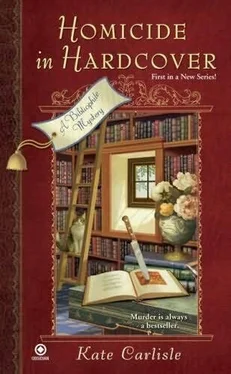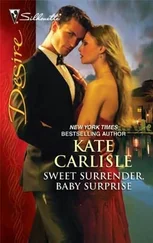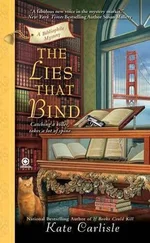Okay, maybe I’d imagined that hungry look, but I hadn’t imagined my reaction. My heart was still stuttering and butterflies flitted around my stomach. How many times did I have to remind myself that Derek Stone was a big jerk and still considered me a suspect? Why else would he be here if not to keep an eye on me?
Well, I was over it. I cleared my throat. “Ian, would you mind raising the lights up a level?”
“No problem,” he said, and crossed the room to fiddle with the lighting panel.
I turned to Derek and whispered, “Stop staring at me.”
He leaned in close. “Don’t flatter yourself.”
“What would you call it, then?”
“I’m watching you.”
My hand fisted and I had to fight the urge to pop him one. “You can’t seriously think I would kill-”
“Better?” Ian said as he stared up at the ceiling, gauging the light level, blissfully unaware of the tension occurring under his nose.
“Perfect,” I said, beaming at him. “Thanks.” I flashed one more stern look at Derek, who smirked, causing my fists to twitch. I was itching to break something, preferably his nose. Too bad I was such a loving pacifist.
“I’m off to a meeting,” Ian announced. He took a minute to hash out a work schedule for me; then he handed me keys and a parking card. As he walked to the door, he reminded me to stop by his office to fill out an employment contract before I left for the day. Just like that, I was a Covington employee.
Derek stood and stretched his arms out. “Guess I’ll leave you to your work.”
“Oh, thanks so much.”
He shot me a look of warning. “For now.” Then he winked at me- winked at me!-and walked out.
Blissfully alone, without Derek Stone sucking the oxygen from the room, I ran both hands through my hair and shook my head and shoulders to get rid of all this built-up frustration. It was Derek Stone’s fault I was feeling all this tension. I laid the blame directly at his feet.
And what kind of a name was Derek Stone, anyway? It sounded like some James Bond wannabe. Of course, I was the last person to criticize someone’s given name, having been named after the New York borough where, legend has it, I was conceived in the balcony between acts of a Grateful Dead show at the now defunct Beacon Theatre. And if that weren’t lowering enough, my evil brothers used to call me the Bronx.
But I digress. No matter what his name was, Derek Stone exuded more animal magnetism than all those Bond men combined. The man paid attention, and he was strong. I thought of the way those lean muscles of his arms had bunched and tensed as they caught and held me. Impressive, to say the least.
Was it getting warm in here or what?
“And this is helping me concentrate how?” With a deep inhalation of breath, I grabbed a bag of peppermint patties from my purse and consumed three as fast as I could. Refreshed, I squared my shoulders, grabbed my handheld magnifying glass and continued checking out the Faust.
I’d thought at first that the Armageddon painting inside the cover had been produced on a thin sheet of canvas. Now I could see it was high-quality vellum, which felt more like parchment even though it was actually fine calfskin that had been stretched and treated to allow for printing-or in this case, painting.
If the artist was also the bookbinder, he had to have known the chance he was taking, using this astonishing painting as a pastedown. Given the nineteenth-century style of applying liberal amounts of wheat starch paste to affix paper and leather to the boards, it was remarkable that the paint’s vibrancy and the vellum itself had survived.
“Uh-oh.” I moved the magnifying glass closer and as if to prove the point, I noticed a significant portion of the painting had peeled away from the top of the inside front cover.
I ran my finger along the loose edge. The underside was still tacky.
“Hello,” I said. The painting hadn’t peeled away on its own. Someone had helped it along, creating a pocket between the vellum and the board. By angling the book toward me, I could see something wedged in between.
“What’s this?” I reached in my bag for my thin tweezers and an X-Acto knife and carefully, meticulously pried more of the painting away from the board.
I maneuvered the tweezers into the space and secured the item, then tugged, ever so slightly, since I had no idea what was in there. What if I tore it? What if it crumbled to dust from the pressure?
But the thing slid easily from its hiding place. I was surprised and somewhat disappointed to find a simple piece of contemporary card stock, maybe four inches square. A note card. Expensive. Sturdy, quality stock.
In the center of the card, written in pencil, was a squiggled “AK,” and a notation, “GW1941.”
The “AK” was obviously Abraham’s initials, but the notation was a mystery, easily solved if I could track down his journal for this job. Abraham had always kept copious notes as he worked, so I had no doubt he’d have an explanation for the note card and his scribbled notation.
It would be a leap to assume that Abraham had slipped the note card into the slender pocket to keep the vellum from fusing to the board, but that’s what I would’ve done. So for now, that was my working theory. So the question was, what had Abraham found in the space behind the painted vellum? And another question: What did “GW1941” mean?
My imagination conjured a secret letter written by Kaiser Wilhelm himself on the German emperor’s royal stationery. Maybe it was a denunciation of some government official and its contents were so inflammatory it had to be hidden away from prying eyes. Or maybe it was a scorching love letter to the emperor from his mistress, assuming he had one. Of course he had one. He was an emperor. Maybe he’d tucked the sexy letter away inside the book as a secret keepsake.
And maybe I was being a twit.
Given Abraham’s notation, the missing item was dated 1941, so an artifact from Kaiser Wilhelm was probably out of the question. Whatever it turned out to be, I hoped it would make a noteworthy piece of Winslow family memorabilia for the exhibition as well as add credibility to the provenance of the book itself.
Most likely, what was missing was something more prosaic, perhaps a receipt or maybe the bookbinder’s description of the materials used to make the book. I didn’t care what it was; I just wanted to see it.
“Abraham, what was it?” I asked, glancing around the tidy workroom. “What did you find?”
I heard a cupboard slam in a nearby workroom and smiled. It was comforting to know there were other binders at work today. Another cupboard thumped shut. My curiosity piqued, I walked out into the hall to meet my neighbors. Another drawer banged shut and I followed the noise to Abraham’s door. It was still closed up with yellow crime scene tape draped across it.
Someone was inside.
I pushed the unlocked door open and saw Minka on tiptoe, peering into one of the cupboards above the sideboard.
“Why am I not surprised?” I said.
She gasped and whipped around. That was when I noticed the little pile of supplies she’d amassed on the worktable.
“Pilfering?” I asked cheerily.
“What the hell do you want?”
I slipped under the crime scene tape and came inside to take a closer look at what she’d found.
“Get out of here!” she cried.
“I’m just looking,” I said, and picked up a polished wood box with the initials “AK” engraved on the top.
Abraham’s personalized set of Peachey knives.
“I have dibs on those,” she said. “Get your dirty meat hooks off them.”
I shook my head at her. “You’re a pathetic thief.”
“Those are mine.”
Читать дальше












